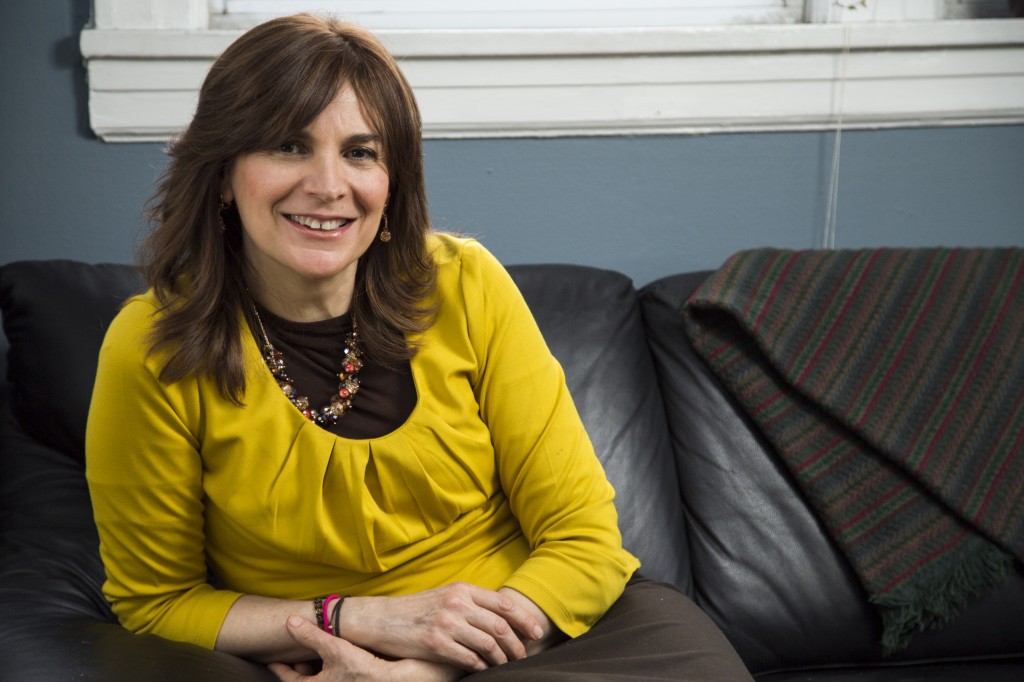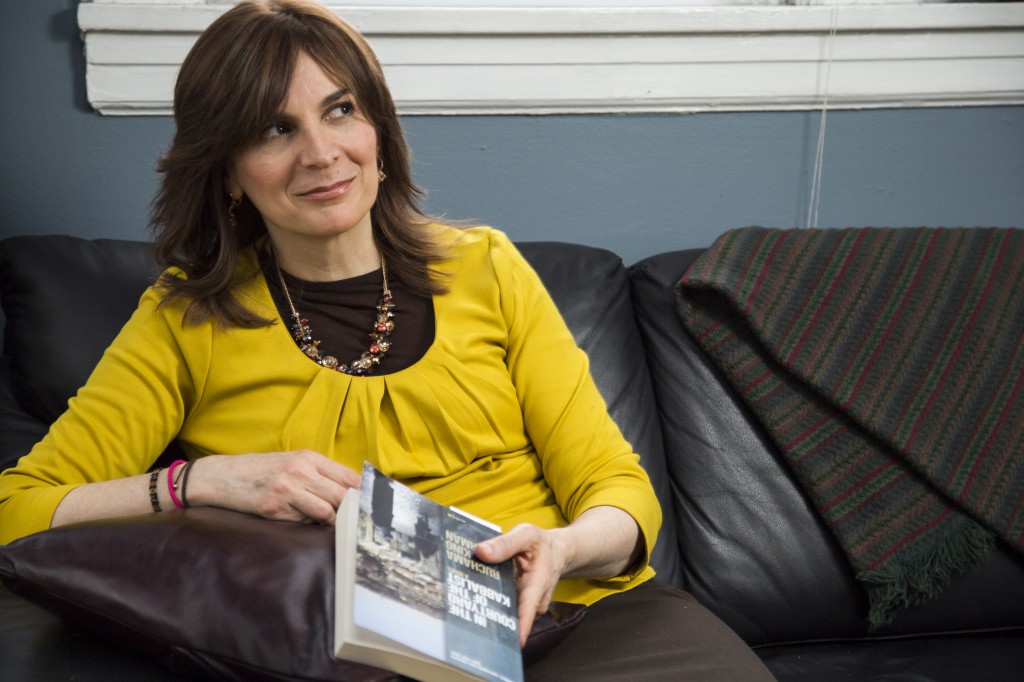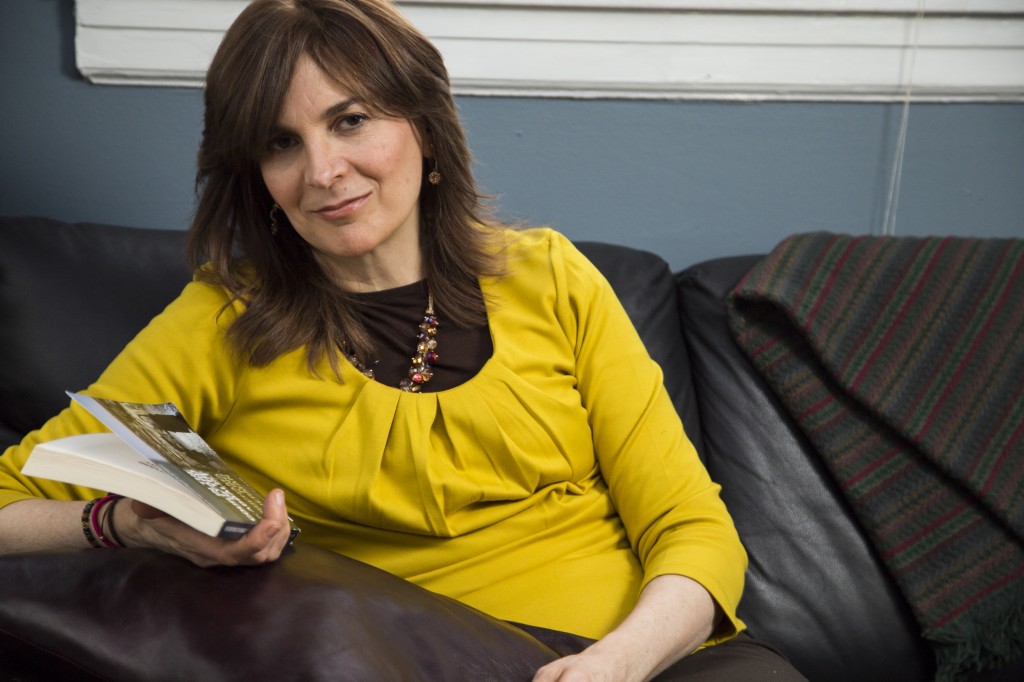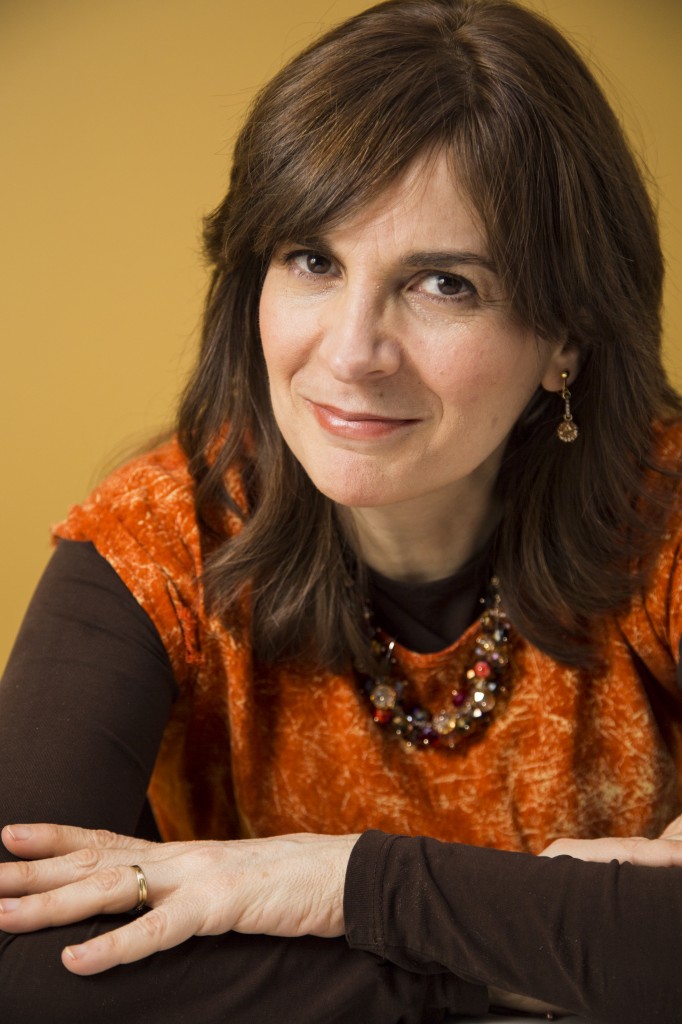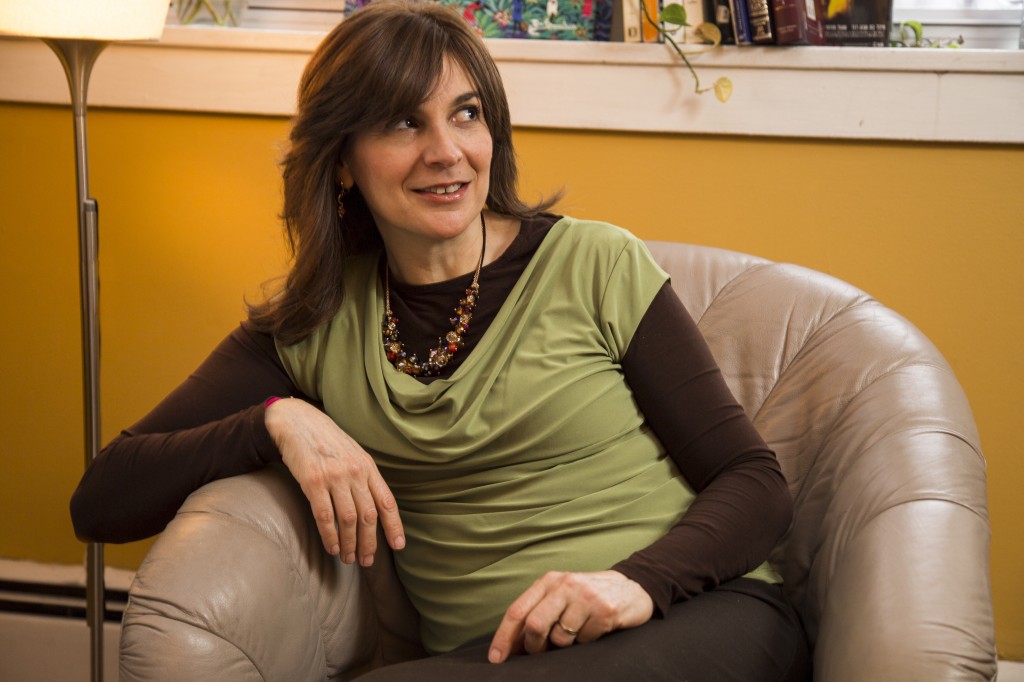She spent ten years in Israel, but never immigrated. Now Ruchama King Feuerman has written her second novel set in the Holy Land, and shows us how an oscillating identity can become a source of the most inspiring art.
Ruchama King Feuerman, an American, is now the successful author of two novels set in Israel: Seven Blessings (St. Martin’s, 2003) and, much more recently, In the Courtyard of the Kabbalist (NYRB, 2013). Of course, both America and Israel have always enjoyed an abundance of Jewish writers, but Feuerman is unusual. Her life and work embody the dual existence of the Jewish people in the 21st century, with its many contradictions: Israel and Diaspora, religion and secularism, the position of women in Judaism and modern society, and the search for meaning in both art and faith.
She is able to do this because of her ability to enter into the worlds of radically dissimilar characters, many of them sharply different from herself, even as she personally leads an observant life. Her own biography attests to a constant state of duality, a hesitation to commit fully: Feuerman lived in Israel for ten years, but never formally immigrated. As an Orthodox Jew she believed in living in Israel, yet never made the leap from American to Israeli.
How did Feurman go from being what she describes as a “chameleon,” metamorphosing in order to fit in with a variety of groups but with allegiance to none, to a writer who has garnered rave reviews from authors as diverse as Bill McKibben, Dara Horn, Jonathan Kellerman, Steve Stern, Alice Elliot Dark, and Lara Vapnyar? The story of her development as a writer starts with her life in Israel and continues after her return to the United States, where she now lives in Passaic, New Jersey, following a detour into an MFA program at Brooklyn College, where she studied with Jonathan Baumbach (father of movie director Noah Baumbach) and found a husband in a group of religious Jewish writers she helped organize.
I met Feuerman on Christmas Day, 2013 in the office where, on other days, her psychoanalyst husband sees his patients. We sit in a room where troubled souls gather for group therapy and she tells of her time volunteering in a Jerusalem mental hospital. There, she met “the wildest characters imaginable.” When off-duty, she would sometimes run across former patients in the street, such as a man blowing a shofar in the middle of a movie theater. Even though she interacted with people who were often deeply disturbed, she felt that there was “a cloud of protection” over her, where “nothing bad could happen to me.” As I speak with her, I begin to feel that her time in Israel served as an opportunity to enter the collective unconsciousness of the Jewish people, with its extraordinary and daunting diversity. Her husband’s office, reserved for groups of distressed minds, seems to parallel her experience in Israeli society, far from the deeply individualist United States.
To an extent, Feuerman seems aware of this. “Israel has definitely given me my inspiration,” she says. Her experience of daily life in the Jewish state was one in which “outrageous stories are handed down to you, and then you have to tone them down to make them believable”; a place “filled with irony and tragedy.” Now she feels lucky to have had those ten years in Israel. Now that she does not live there, she writes to me in an email, “it’s painful to visit Israel as a tourist. It’s like being allowed to only flirt with someone when really you want to be married to him.”
There is no doubt that Feuerman’s time in Jerusalem was formative. She felt adrift in a sea of “niks”—kibbutzniks, Likudniks, peaceniks—each label defining a person’s relationship to a specific group and the larger society. But she felt unready to stake her claim with one group. It felt like “too much of a cutting away of others.” Instead, this period in her twenties became a time “of great seeking, its own intensity.”
Her unwillingness to commit herself had an impact on every aspect of her life, including dating. “Ambivalence about who you are,” she says, “gets foisted onto other people.” She felt a “strong pressure, you could feel it in the air, to marry a kollel guy, a yeshiva guy. Those were the men I tended to date then.” But, in contradiction to the values of many Orthodox Jews, she felt more comfortable with men who worked and could support themselves and their families. She did not want to “fall in love with someone who couldn’t earn a living. Too crazy, too risky.” For her, Israel was not the right place to fall in love, a theme that recurs in both her novels.
This sense of being unable to commit—even to another individual—was present in her work life as well. In a sense, however, this worked to her advantage as a writer. Israel in the 1980s, she told me, lacked a strong sense of professionalism. People did not feel defined by their careers. It was a time and place where it was perfectly acceptable to get a job that enabled her to work half the day and write the rest of the time. So she worked as a secretary and tutor at various colleges that teach Torah to women. At that point in her life, she felt “competing desires,” and didn’t know which would become more important: Torah study or writing.
Careers didn’t seem that important to anyone else she was meeting at the time, either. Many of them were newly Orthodox, people who interrupted their studies or careers to concentrate on rediscovering Jewish study and observance. Feuerman found this encouraging. “If this Harvard person interrupted their career to study,” then she could too. She didn’t feel the “pressure to develop a typical, normal career” as she would have in the U.S. And she loved the flexibility of Israeli society, where anyone could become a valued member of society, if they had the right personality.
Feuerman gets especially eloquent on the subject of how in Israel, “even a bus driver can be a big deal if he has a hevreman [i.e., everyman] personality.” He becomes “like a firefighter,” because you are putting your life in his hands while he drives. He is a sort of social worker, guiding a process of seat negotiation where passengers of all different beliefs and ethnicities must be satisfied. He has to check for suspicious objects and handle money. Though it appears at first glance to be a “non-intellectual job,” a friendly bus driver can viewed with a lot of respect, even seen as a high-status person, while a doctor who lacks personality may enjoy less prestige.
This sense of a democracy of the spirit, and the necessity of paying attention to competing groups and demands, is very much present in the characters and situations that Feuerman writes about. Indeed, she says that one of the reasons she writes is that “I want to bring my people through various experiences of Israel so people can’t dismiss each other.” Her latest novel, In the Courtyard of the Kabbalist, concerns itself with, in Feuerman’s words, “all the people you don’t want to know from, all the people you are going to pass by on the street. Sometimes, we think because we’ve seen the newspaper headlines or read popular novels or seen a movie about a certain marginal group—say, the Haredim or Arabs—we think we know all about them. They’ve been captured, identified, there is nothing left to explore—I know you already. As far as I’m concerned, you’re over and done with. I hate that.” She writes about these issues because “people might have their different ideologies, their fixed stances, but I’m betting some part of them is open to the divine presence in every human being.”
This visceral description of the intensity of her relationship with the Israeli experience also carries over into her writing, which is often forthrightly and unapologetically emotional. Writer Alice Dark once remarked that her first draft is written “like a teenager, schmaltzy, crying.” Feuerman thought this comment was liberating. We live in an age, she says, where we want to be “cool, sophisticated, edgy, ironic, and clever.” But Feuerman wants to be “as schmaltzy and full of feeling as I am in the moment when I write. I am not censoring my heart.” She adds that, even when writing is beautiful, full of “sentences to die for,” it can still lack something “happening on the heart level.” Afterward, in further drafts, she edits out the “overwrought stuff” and comes to a place of balance. The main thing is not to censor the heart at the point of the story’s conception. She believes that “somehow your job is not to be so witty when you write, just get into the person’s mind and follow their thoughts in a real way.” In this way, “some of the plainest writing can be so powerful if it is true to that person’s thoughts.”
Feuerman’s ability to “get into the person’s mind” is on display throughout In the Courtyard of the Kabbalist. The book is centered around the courtyard of a Jerusalem rabbi. Together with his rebbetzin Shaindel Bracha and assistant Isaac Markowitz, a cross-section of Jerusalem humanity comes to seek the rabbi’s wisdom and healing, both spiritual and practical. These include such diverse characters as Dalia, an anorexic teenage girl for whom the rebbe saves a piece of fruit each day, watching her eat in order to make sure it feeds her weak body; a basketball player he watches play in order to give him confidence; and an obese beggar beset by all manner of unpleasant body odors. “He was used to escorting confused, sad, incensed, or scared people into the cottage one by one,” Feuerman writes of Isaac, “and then watching them emerge from the rebbe’s studio ten, fifteen, twenty minutes later with faces looking like some freshly peeled hard-boiled egg, pure and vulnerable. Clarified somehow.”
When the rabbi dies, the rebbetzin tells Isaac, who is not an ordained rabbi, that he must continue the master’s work. She tells Isaac that he needs to have faith in himself.
“What is faith anyway?” he said as if he could live without it.
“Isaac, you must believe in your own goodness.” Her light brown eyes looked with a warmth into his own. “The good is in you. It doesn’t go away.”
He wrapped her words around him like a fine cloak. In the word rebbetzin was the word rebbe. She had been his rebbe and more, but he had been too blind to see. Anyone could have seen the signs. His skin, though, must have known all along. He’d hardly had an eczema attack in the past month. He’d had her close by, helping him, guiding him. As the sages wrote, the greatest charity was enabling a person to stand on his own feet, to the point where assistance was no longer necessary.
Prior to our meeting, I asked Feuerman in a phone interview about the source of the spiritual strength that enables a rebbe to effect another person. She responded that she did not want her book to be “about somebody with mystical powers.” What makes a rebbe special is a “holy imagination… an ability to utterly throw yourself into another person’s reality, to feel them, to feel their pain.” A tzaddik, she says, is able to pray for another because “when he says ‘I’ it includes ‘you.’” Most people, she says, might be able to pray for their spouse and children, and really mean it. A more compassionate person’s prayers might extend to his neighbors, or good friends, but there it stops. “for a deeply mystical and spiritual person, his or her ‘I’ can include many people.” A tzaddik, she says, is able to pray for another because “when he says ‘I’ it includes ‘you.’”
This sense of humanity, of using the imagination to understand others, is also, of course, the job of the writer. Feuerman all but acknowledges this when she says, “in a way that is what my book is about.” It becomes clear in the course of our interview that Israel was the place Feuerman learned this essential skill of understanding others and how to enter into their personal reality.
“To possess another language,” Charlemagne once said, “is to possess another soul.” And indeed, for Feuerman, moving to another country and living her life in a new language gave her a different self. She tells me, as we sit in her psychoanalyst husband’s office, “When I came to Israel when I was 17, I felt like I was a totally different personality, more friendly, outgoing, more outrageous, comic.” This, she says, was because Israel is “an extroverted society,” and because there was “a slight disconnect between me and the Hebrew language. I could say things in Hebrew that I would never dream of saying. I could be much bolder in Hebrew.” When asked what it would be like if she could write in Hebrew, she says, “I would love to see what a different side of me would emerge if I could write well enough in Hebrew, and I have no idea what that would be. I would love to be surprised.”
There was something wonderful, she says, about the intensity of Israeli life. She loved meeting all the brilliant, passionate, hilarious and odd people that tend to come to Israel or have lived there all their lives—talking with them, spending Shabbat with them, getting to know them. Comparing life in both places, she remarks, “Truthfully, the American Jewish experience is a much flatter experience.” American Jewish life, she insists, is “flatter, drier, missing a certain spice of being Jewish.” Being in Israel is a “more holistic, thrilling existence than being a Jew in America.” This reminds me of controversial comments made by Israeli writer A.B. Yehoshua. “This is the reason I say to American Jews,” he said, “you are partial and we are total.… If you really want to be Jewish, come here. It’s not easy, full of questions; your nice warm Jewish identity in your community will be over. But this is real and not imaginary.” Yet unlike Yehoshua, Feuerman is American-born and makes her life in the United States.
What marks Feuerman’s version of Israel, both in her novel and in what she says of the country, is this refusal to shy away from the real. Her work, despite her prodigious imagination, is not imaginary. For example, she does not have what she calls an “airy-fairy let’s love everyone” attitude toward the Arabs. Israeli friends of hers have been killed: children she has known, her childhood babysitter. She looks at “the hatred and the difficulties” head on, yet believes that somehow Jews and Arabs must be “able to see each others’ souls at the same time. Even with all the tribal conflict between us.”
I asked about her vision of Israel, and she was left unsatisfied with her answer. Later, she wrote me an email saying,
My fantasy or vision is for an Israel that sees how vitally necessary the other one is; that other group that’s so hard to consider or take in, or who you wish would just disappear. We each contain a piece of the Israel story, and if one of those pieces were gone, it would be a distorted story. Whether we know it or not, our stories—divergent as they are—borrow from and nurture each other. This is the epigraph to my novel:
If I tell you my story
you will listen for a while,
and then you will fall asleep.
But, if, as I tell you my story,
you begin to hear your own story,
you will wake up.
It seems to me that it is precisely this, the refusal to censor the heart, that makes Feuerman’s work so powerful. The rebbe is a man whose pillows are soaked with tears every day. It is this intense “power of empathy,” she tells me, that gives him his spiritual power; and gives his wife the same power, if not even more. This kind of empathy, she says, “can be transferred.”
It appears in the character of Isaac as well. At a moment of crisis, Isaac finds sudden compassion for Mustafa, an Arab custodian who brings him Jewish antiquities found on the Temple Mount. “Be safe,” Isaac says, “be well. Be loved. I love you.” Feuerman writes, “He uttered the words under his breath, then stopped. He had never even told the rebbe that. He touched his beard in surprise. It was wet with his tears.”
Indeed, in many ways it is the relationship with Mustafa that most displays the power of empathy. Mustafa, who can only see sideways as a result of being born with a crooked neck, has been rejected by his family, particularly his mother, who is ashamed of her deformed child. He lives alone in Jerusalem, far from his home village. In their first, chance meeting in the Old City of Jerusalem, Isaac tells him that he is “like the kohen” because he helps keep the holy mountain clean.
Isaac’s comment leads Mustafa to value the artifacts he often finds in the rubble on the Temple Mount, particularly those with Hebrew letters, which are clear evidence of the ancient Jewish presence on the Mount. The sheikh who oversees his work dismisses the antiquities as junk, hoping to prevent the publicity that often accompanies any object connected to such a holy site. But Mustafa has been moved by Isaac’s respect, and gives him a gift—a small red stone pomegranate. The trinket, examined by a Tel-Aviv University archeologist whose mother’s tumor disappeared after the rebbe prayed for her, turns out to be ancient, possibly from the First Temple period. Possession of such an antiquity results in Isaac being arrested and thrown in jail.
The policeman who interviews Isaac tells him that, in Hebrew, the word for pomegranate, rimon, is also the word for hand grenade. But Isaac can think only of the adage, “Even the most empty, vain Jew is as full of good deeds as a pomegranate is filled with seeds.” The policeman tells Isaac, “This sweet little pomegranate could cause a big bomb in the Middle East.” He cannot prevent the Waqf from doing what it likes on the Temple Mount. “You can be as idealistic as you want,” he says. “My job is to be pragmatic.”
Isaac rejects the policeman’s point of view and insists on continuing his relationship with Mustafa. When he arrives to ask about the fate of the artifact, he and Isaac share a bag of nuts.
Maybe there was some hope for both people, Isaac thought. At least they agreed to share the word for love, and maybe a bag of nuts. And could be even more. He once stumbled upon a research study that proved Palestinian Arabs shared a greater gene pool with Ashkenazi Jews than they did with Arabs of different countries.
As is obvious from the above, Feuerman’s writing, like all things Israeli, intertwines the personal and the political. “If we can’t hear the other person’s story,” she tells me, “then we are lost. Maybe doomed. Our stories complete each other.”
As we leave her husband’s office, the sunset has lit up the sky in a burst of incandescent pink and blue. The street, prosaically named Main Street, had been quite ordinary. But now the sunset has completely transformed the landscape. Feuerman’s writing is similar. She writes about ordinary things—janitors, bus rides, people waiting to see the rabbi—and transforms them in front of our eyes into fascinating objects that become beautiful once she shows us how to experience them.
I remark that I was thinking earlier about what it means to talk about fiction in a room devoted to psychological analysis; to plumbing the depths of ideas, emotions, feelings. She says that in the 19th century, before analysis, fiction could have served the same purpose that psychology does now. It allowed people to approach their feelings and experience themselves and others, make sense of themselves in a way they haven’t done before.”
Perhaps this is what is special about fiction, as opposed to other literary genres. Its purpose is to “thrust readers into the realm of experience.” Feuerman adds,
Once you have waited in the courtyard to visit a kabbalist, or waited on a bus where you have seen all the different groups loving and hating each other, it is in your bones and in your kishkas; how you talk to people about different groups, and you have a different consciousness of how you are going to be talking about different sects in Israeli society, hopefully with more compassion and insight. We have so many facts that are coming at us with the Internet, the whole TMI thing. There is too much information but can never be enough experiences.
When I ask if her writing would be different if she lived in Israel, having the Israeli experience firsthand, she laughs and says, “I hope one day to find out.” Her dream is to live for half the year in Israel and half in the United States. Even now, she does not want to commit entirely to one or the other. Yet just as she ultimately committed to writing, a spouse, and a family, she now seems committed to life in Passaic, while still retaining the dream of what it would be like to write in, not just about, Israel.
![]()
Banner Photo: Ilir Bajraktari / The Tower






